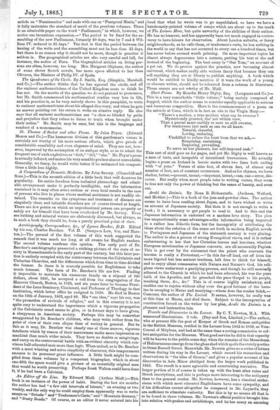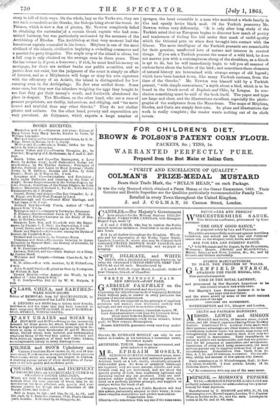Travels and Discoveries in the Levant. By C. T. Newton,
M.A. With numerourf illustrations. 2 vols. (Day and Son, Limited.)—The anther, who at present fills the post of Keeper of Greek and Roman antiquities in the British Museum, resided in the Levant from 1852 to 1859, as Vice- Consul of Mitylene, and had at the same time a roving commission to col- lect antiquities for the Museum. What good service he did in that capacity will be known to the public some day, when the remains of the Mausoleum of Haliearnassus emerge from the glass shed which spoils the s tately portico in Great Russell Street. Meanwhile Mr. Newton gives us a series of letters written during his stay in the Levant, which record his researches and observations in "the isles of Greece," and gives a popular account of his discoveries in Asia Minor abridged from the larger work published in 1862. The result is a most agreeable and entertaining narrative. The larger portion of it of course is taken up with the hunt attar rains and Greek inscriptions, and this is perhaps more interesting to the antiquary than to the general reader. Mr. Newton, however, has a classical enthu- siasm with which most educated Englishmen have some sympathy, and if his difficulties cannot altogether be compared to Mr. Layard's, they are sufficient to stimulate curiosity. But this is by no means all that is to be found in these volumes. Mr. Newton's official position brought him into relation with pashas and archbishops, and he has many an amusing story to tell of their ways. On the whole, lazy as the Turks are, they are not such scoundrels as the Greeks, the bishops being about the worst. At Patmos, which is now a den of pirates, Mr. Newton completely failed in obtaining the surrender:of a certain Greek captain who had corn- nutted barratry, but was particularly enchanted by the manners of the Archbishop of Rhodos. The Archbishop at that very moment had the barratrous captain concealed in his house. Mitylene is one of the most civilized of the islands, civilization implying a swindling commerce and a passion for potty litigation. The staple crop of the island is olives, but a full crop is only obtained on the average once in three years. Thus the Ian lowner is, if poor, a borrower ; if rich, he must lend his money on mortgage, for there are neither banks nor public securities, and as justice does not exist, but the judgment of the court is simply an affair of interest, and as a Mityleniote will forge or deny his own signature with the effrontery of an Asiatic, the island is distinguished for low cunning oven in the Archipelago. No Jew ever settled there. Some came once, but they saw the islanders weighing the eggs they bought to see that they got their money's worth, and forthwith abandoned the place in despair. The Rhodians, on the other hand, who are a race of peasant proprietors, are thrifty, industrious, and obliging, and "far more honest and truthful than any other Greeks." They do not shelter pirates and outlaws. On the other hand, poverty and superstition are very prevalent. At Calymnos, which exports a large number of sponges, the head constable is a man who murdered a whole family in CO3 and openly levies black mail. Of the Turkish peasantry Mr. Newton writes very differently. "It is only after long study of the Turkish mind that an European begins to discover how much of poetry and tenderness of feeling lies hid under that mask of stolid apathy which the Oriental puts on when first brought into contact with the Giaour. The more intelligent of the Turkish peasants are remarkable for their genuine, unaffected love of nature and interest in created things. If you ask a Turkish peasant the name of a wild bird, he does. not answer you with a contemptuous shrug of the shoulders, as a Greek is apt to do, but he will immediately begin to tell you all manner of curious facts about the habits of the bird and sometimes these elements of natural history are intermixed with strange scraps of old legend ; which have been handed down, like many Turkish customs, from the time of the Greeks." Mr. Newton was himself told by a Turkish peasant, "with simple earnestness," a myth about a bird, which is to be found in the Greek novel of Daphnis and Chloe, by Longus. In con- clusion something must be said of the book itself. The paper and type are large and clear, and the illustrations excellent, especially the photo-.- graphs of the sculptures from the Mausoleum. The maps of Mitylene, Rhodes, and Caria are simply first-rate. In plans and illustrations the work is really complete ; tho reader wants nothing out of its cloth covers.































 Previous page
Previous page